Who Died? Did Trump Know? What About the Hostages? Five Key Questions on Israel’s Strike in Doha
More than 24 hours after Israel struck a meeting of senior Hamas officials in Doha, Qatar, the dust has yet to settle, and there are still more question marks than exclamation points related to this shocking development.
This was the first time Israel had ever targeted Qatar, a country not officially deemed an enemy of the Jewish state, and home to the largest U.S. armed forces base in the Middle East. But will it be a game-changer in the broader picture of the Gaza war, and in what way?
Here are five open and important questions related to the Doha airstrike.
Did it succeed?
As of Wednesday afternoon, a day after the strike in Doha, very little information had come out about its results on the ground, or what is called in military jargon a "BDA" – battle damage assessment. Hamas and Qatar were quick to announce that the leadership of the Palestinian terror organization, which had gathered in Doha to discuss a recent U.S. cease-fire proposal, emerged unscathed. But such statements should be treated with suspicion, at least until images of those targeted are made public.
The targets of the strike were Hamas' political leaders, all of whom live in exile and are only one part of the organization's decision-making process, which also involves its military leadership inside Gaza. However, most members of the Gaza leadership have been killed by Israel over the past 23 months, a reality which has shifted the balance of power within Hamas farther toward the external leaders based mostly in Qatar and Turkey.
Among those present at the meeting on Tuesday was Khalil al-Hayya, the most senior Hamas official outside Gaza who was fully aware of the October 7 attack plan. According to Qatar and Hamas, his son and one of his senior aides were killed by the Israeli strike, but his fate remains unclear. Alongside him were several other high-ranking Hamas figures. After initially expressing confidence that they had been eliminated, Israeli sources sounded more cautious on Wednesday.
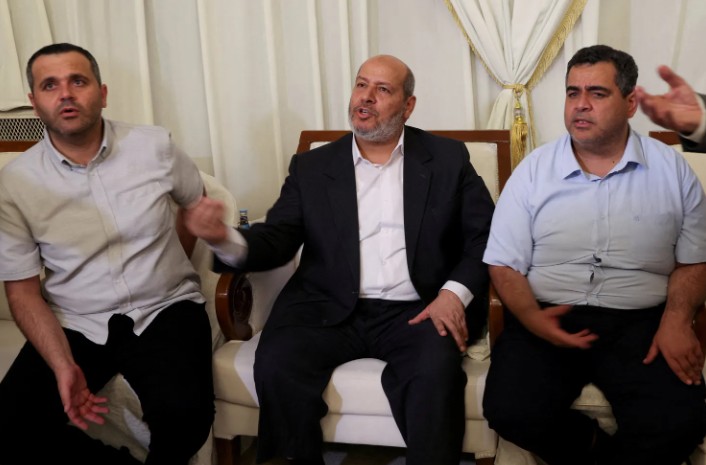
Hamas official Khalil Al-Hayya, center, at a gathering grieving assassinated Hamas chief Ismail Haniyeh in Doha last year. (Photo credit: Ibraheem Abu Mustafa/Reuters // Haaretz)
Still, until Hamas is able to produce conclusive evidence that the leaders present at the Doha meeting are alive, this will remain an open question.
Will it harm negotiations to release the Israeli hostages?
Of all the unresolved questions, this one is the easiest to answer – but also the most frightening and uncomfortable one to discuss. After more than 700 days of war, the fate of Israel's hostages in Gaza – including 20 who are considered to be alive, and 28 who are likely dead – could be sealed by this airstrike, irrespective of whether it succeeded or failed to eliminate Hamas' leadership.
If the group's leaders are dead, it's not clear with whom Israel will be able to negotiate over a cease-fire and hostage release deal. It's true that Hamas still has less than a handful of military leaders hiding in the tunnels of Gaza, but unlike the political leadership in Doha, they have very little contact with the outside world and certainly aren't in a position to exchange drafts and discuss future plans with diplomats from the three mediating countries (the U.S., Qatar and Egypt). Reaching a deal with them will be much more difficult, if only for technical reasons.
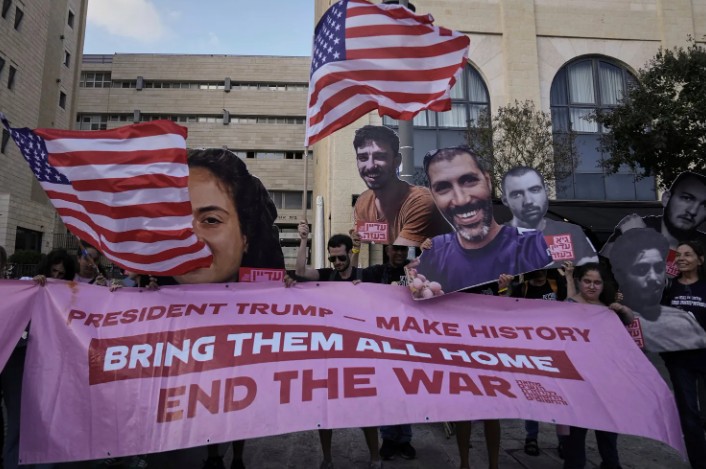
Hostage families and their supporters protest the ongoing war outside the U.S. Embassy in Jerusalem yesterday. (Photo credit: Mahmoud Illean/AP // Haaretz)
But even if the strike didn't succeed, it's not clear if the surviving Hamas leaders won't use it as the perfect excuse to freeze the negotiations and pin the blame on Israel. After all, they were literally meeting to discuss U.S. President Donald Trump's cease-fire proposal when Israel had bombed them. As much as Hamas is a monstrous and vile terror organization worthy of condemnation, it will be a hard sell for Israel to convince other governments that its actions didn't harm the negotiations this time around.
The families of the hostages held by Hamas responded to news of the airstrike with a mixture of fear, anger and desperation. They blamed Israeli Prime Minister Benjamin Netanyahu for torpedoing the talks and endangering their loved ones. It's hard to refute these accusations.
What role did the U.S. play in the strike?
It took a very short time for the Trump administration to try and distance itself from the Israeli strike, and within several hours, there was even a hint of American criticism on the subject. But there are few buyers in the region for this version of events. Qatar is home to a huge American military base and an important economic hub in the region. It would be a dramatic breach of trust for Israel to bomb a target within that country behind the back of the United States, its closest and most important ally.
Trump and Netanyahu, in what seems to be a coordinated message, insist that America was informed only a very short time before the attack took place, and therefore didn't have enough time to inform Qatar of the incoming missiles. Trump added that he was "unhappy" with the entire ordeal, whatever that means. But the real way to test the validity of these briefings is to ask a simple question: Did Netanyahu pay a price, in his relationship with the Trump administration, for this action?
So far, the answer seems to be no, and therefore, the messaging coming out of Washington isn't very convincing. This will change only if Trump increases his pressure on Netanyahu to end the war via a comprehensive hostage release and cease-fire deal.
Will Qatar withdraw from mediating between Israel and Hamas?
In the immediate aftermath of the airstrike, Qatar announced that it will suspend its role as a mediator between Israel and Hamas. This was an obvious response, but the billion-dollar question is whether it's a temporary reaction or a long-term strategic decision. Trump, in an attempt to soothe the Qataris, said that what happened on Tuesday will not happen again, basically drawing a red line for Israel. He also pleaded with the Qataris to continue their efforts for reaching a cease-fire.
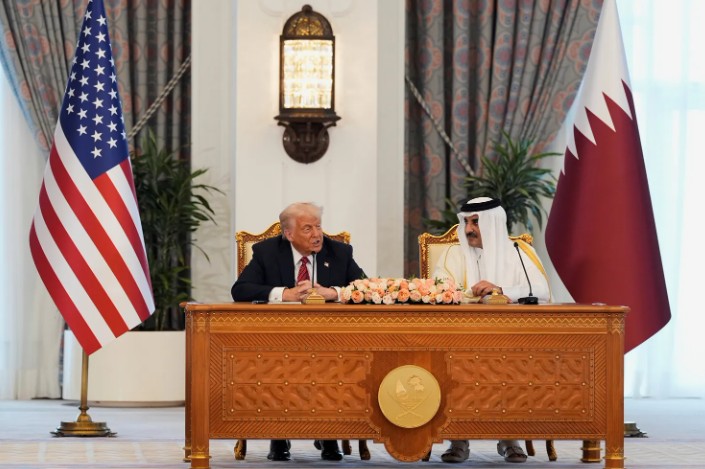
But even before this airstrike, both Qatar and Egypt were showing signs of losing patience and giving up on the talks, mostly because of Trump's tendency to excuse Netanyahu's actions and accept all of his demands in the negotiations. Netanyahu broke the previous cease-fire, reached in January 2025, by renewing the war two months later, despite Hamas' willingness to continue into the second phase of that cease-fire agreement and release all the remaining hostages in return for an Israeli withdrawal from Gaza. Trump, instead of insisting that the cease-fire be respected by both sides, allowed Netanyahu to do this.
Now, six months later and with almost 60 Israeli soldiers killed since the resumption of the war, Trump is again giving Netanyahu a free hand, this time to reject a cease-fire and hostage release deal offered by Egypt and Qatar, and accepted by Hamas; instead, the president has adopted a plan drawn up by Netanyahu and his right-hand man, Ron Dermer, which everyone knows will not be accepted by Hamas.
The Doha strike, in that regard, may be the straw that broke the camel's back – especially since it comes on top of a growing sense of despair, much due to Trump's allegiance to Netanyahu.
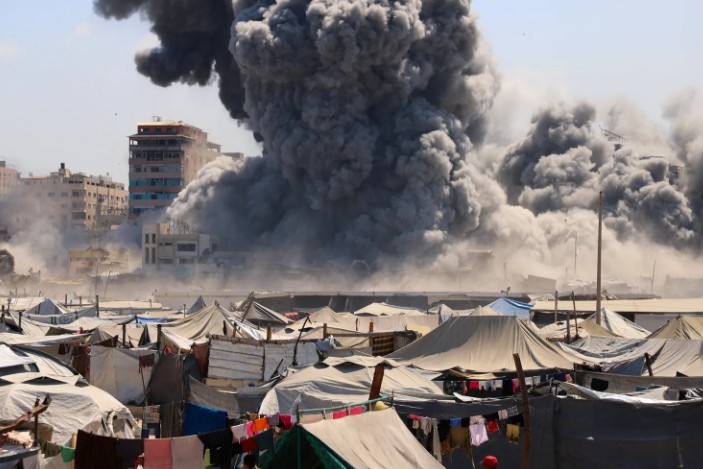
Will it impact Israel's impending ground offensive in Gaza?
This final question relies on all the previous ones and is perhaps the most important of them all. If a hostage deal is now off the table, and Trump has no intention to apply pressure on Netanyahu to change his ways, the result is clear – Israel's expansion of the war deeper into Gaza City becomes inevitable, with all the difficult consequences involved.
Cynics will presume this was Netanyahu's intention in the first place: to eliminate Hamas' negotiators, kill any chance of successful negotiations and leave the military option as the only option left. In that sense, the strike probably reached its goal – in the worst way possible.
[Amir Tibon is an award-winning diplomatic correspondent for Haaretz, and has previously served as the paper’s correspondent in Washington, D.C., and as a senior editor for its English edition. He is the author of The Last Palestinian: The Rise and Reign of Mahmoud Abbas (co-authored with Grant Rumley), the first-ever biography of the leader of the Palestinian Authority. He, his wife, and their two young daughters were evacuated from their home in Kibbutz Nahal Oz after the October 7 attack, and are currently living in temporary housing in north-central Israel.]

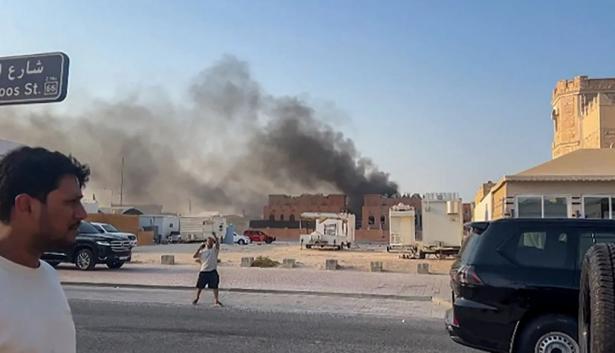
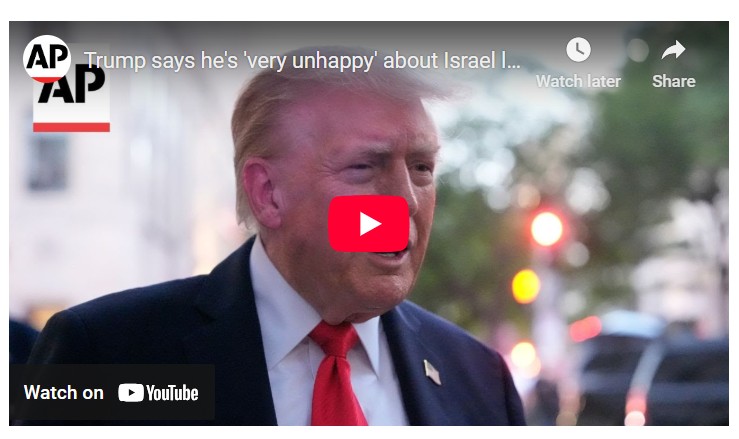
Spread the word